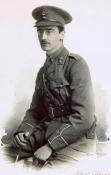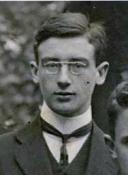
|
The King's School Canterbury |
Roll of Honour |
| Lieutenant Percy Baglietto COTTRELL MC, Chevalier of the Order of the Redeemer, Greek | |
|
19th (2nd Public Schools) Battalion Royal Fusiliers (City of London Regiment) attached to I Department General Staff Date of birth: 16th April 1893 Date of death: 27th September 1918 Died of wounds aged 25 Buried at Sarigol Military Cemetery Kriston Row C Grave 414 |

|
| He was born at Syra in Greece on the 16th of April 1893 the second son of Captain William Henry Cottrell CMG OBE RNVR, HM Consul, and Luisa Celestina (nee Baglietto) of 16 Odos, Loukianou, Athens in Greece. He was educated at the King's School Canterbury from September 1906 to July 1912 where he was a Junior Scholar and was appointed as a monitor in January 1911. He played as a forward for the Rugby XV in 1910 and 1911 and was awarded his sports colours in 1911. The Cantuarian wrote the following of his rugby in 1911:- "Very vigorous forward and fearless tackler. Unfortunately injured during a good part of the season." He was in the Rowing IV in 1911 and 1912, being awarded his Rowing Colours in 1911 and was Hon Secretary of the Boats in 1912. He was elected as a member of the Sports Committee in September 1911 and was a member of the 1st Tennis Pair in 1912. He was a member of the Officer Training Corps throughout his time at the school and was promoted to Sergeant in February 1912. He received the Waddington Gift and won the school Classical Composition Prize in 1912. In 1912 he went on to Worcester College Oxford on an Open Classical Exhibition and he stroked in the Oxford Trial Eight in 1913. On the outbreak of war he was in Athens and immediately returned to England to enlist. The train journey from Brindisi to Ostend took six days with the railway running as close as twelve miles from the German advance in places. On his arrival he applied for a commission but this was rejected on account of his poor eyesight. Instead he enlisted at Westminster as Private 547 in the 19th (Service) Battalion Royal Fusiliers (City of London Regiment) (2nd Public Schools), University and Public School Corps on the 4th of September 1914. At a medical examination, which took place on the same day, it was recorded that he was six feet and half an inch tall and that he weighed 159lbs. Also that he had a "fairly" dark complexion, brown eyes and dark brown hair. He rose to the rank of Company Sergeant Major before being commissioned as a 2nd Lieutenant in the battalion on the 15th of January 1915. On the 24th of April 1916 he received orders to report for an interview at Room 335 at the War Office to discuss his transfer to the Intelligence Department as an interpreter due to his knowledge of the Greek language. He embarked for Salonica on the 13th of May 1916 and was officially transferred to the Intelligence Corps on the 18th of May 1916. He landed at Alexandria on the 29th of May and proceeded to the Officers Base Depot at Bishr. He was posted to the Intelligence Department, General Headquarters in Salonica for service as an interpreter on the 17th of June 1916 and joined 78 Brigade there on the 24th of June. He was admitted to 42 General Hospital on the 30th of August 1916 and transferred to 28 Casualty Clearing Station the following day when he was placed on board No. 41 Ambulance Train. He was promoted to General Staff Officer 3rd Class on the 1st of December 1916. On the 19th of January 1917 he reported for service on a special mission to Athens and embarked at Salonica for Mudros the same day; he returned to Salonica on the 9th of August 1917. For his services during this mission he was awarded the Chevalier of the Order of the Redeemer 5th Class which was conferred by King Constantine and was announced in the London Gazette of the 9th of April 1918. He was also later awarded the Greek Military Cross 3rd Class and was mentioned in despatches. On the 14th of September 1918 he was attached to the Headquarters of 84th Brigade. On the 18th of September 1918 he was hit in the side of the chest by a bullet during operations to the East of Lake Doiran and was evacuated to 25 Casualty Clearing Station where he was thought to have been recovering quite well but took a turn for the worse. His mother received the following telegram dated the 28th of September 1918: - "Report O.C. 25 Casualty Clearing Station Salonica reports September twenty fifth Lieut. P.B. Cottrell Intelligence Officer dangerously ill. Further news when received." Before the telegram had reached her he had died of pneumonia as a complication of his wounds on the 27th of September. She received a further telegram dated the 2nd of October 1918: - "Deeply regret Lieut. P.B. Cottrell Intelligence Department died of wounds September twenty seventh. The Army Council express their sympathy." He was awarded the Military Cross for this action which appeared in the London Gazette of the 1st of February 1919:- "During the past two years he has rendered very valuable services as intelligence officer in the field, and shown great devotion to duty. On 18th September, 1918, he was mortally wounded whilst gallantly attempting to carry information under very heavy machine-gun and rifle fire from the British brigade which was in support to the Cretan Division in the firing line." Fellow OKS, T.H. Keble wrote of him:- "...My chief object in writing is to let those who knew P.B. Cottrell have a few of the facts about him when he was wounded, and how he eventually died last month. He was in the Intelligence Corps and during operations east of Lake Dorian which commenced on 18th of Sept., he acted as a Liaison Officer, between the flank British Brigade and the flank Greek Regt. he received a bullet wound in the side. I visited him in hospital and was pleased to find him sitting up and feeling much better but extraordinarily hungry. It was just before seeing him that I had heard the news of the Bulgars withdrawing-a fact that cheered many of the wounded who had taken part in the attack the previous day. A few days later we were ordered away to go across towards the Vardar. So I was unable to see Cottrell again. It was only the other day that I learned that he had died-pneumonia having set in. Everyone had a good word for him and the work he did both before, and especially since the Greeks were mobilized, was of the greatest use in breaking down the barrier to conversation between ourselves and the Greeks. He was selected to proceed at one time on a special mission to Athens and was decorated by the Greek Government with the Order of the Redeemer." He is commemorated on the war memorial at Barham in Kent and on the memorial at Worcester College Oxford. |
|
 | |
| Day Boy |
Back